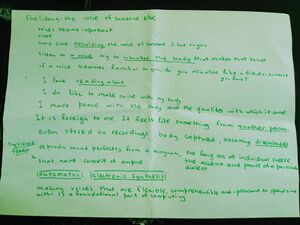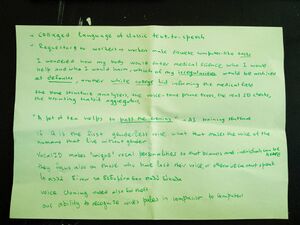References: Difference between revisions
No edit summary |
|||
| Line 74: | Line 74: | ||
==This track may contain politics by Hannes Liechti== | ==This track may contain politics by Hannes Liechti== | ||
From the author, page 10 <br> | |||
" In this book, I argue that analysis of the culture of sampling is | |||
one possible way to access particular narratives of this world. | |||
The inclusion of external music, environmental noises, or found media | |||
material brings the world into popular music tracks in a condensed | |||
form. Timothy Taylor (2001, 139) describes sampling as providing | |||
“aural glimpses of the social.” Every process of sampling represents | |||
a complex net of contexts, meanings, choices, creative decisions, | |||
and musical strategies. In-depth analysis of such processes and | |||
their socio-cultural ramifications means revealing and interpreting | |||
this net as far as possible." | |||
Revision as of 13:16, 2 November 2022
Situated Knowledges By Donna Harraway
Who has a body?
We don't want to represent the world.
We don't want one body
Universality is reductionism
Prosthesis and not objectivity
All vision has an embodied nature
The body is an agent not a resource
How to see from below?
Vision requires instruments of vision
Who can and who cannot?
How to see?
Where to see from?
What limits to vision?
What to see for?'
What other sensory powers do we wish to cultivate besides vision?
Location is about vulnerability
Situated knowledges are about communities and not about individuals
Sex as an object of biological knowledge
Situated knowledges require that the object of knowledge is an actor or agent
Conversation vs discovery
Bodies as objects of knowledge are material-semiotic, generative nodes
keywords
subjugated knowledges
location
embodiment
partial perspective
politics of vision
fantastic imaginings
local knowledges
Counter-sexual Manifesto by Paul B. Preciado
Shell Song
https://pad.xpub.nl/p/shell_song
Pleasure Activism by maree brown
On Sonic Art / Red bird by Trevor Wishart
Deep listening Pauline Oliveros
This track may contain politics by Hannes Liechti
From the author, page 10
" In this book, I argue that analysis of the culture of sampling is
one possible way to access particular narratives of this world.
The inclusion of external music, environmental noises, or found media
material brings the world into popular music tracks in a condensed
form. Timothy Taylor (2001, 139) describes sampling as providing
“aural glimpses of the social.” Every process of sampling represents
a complex net of contexts, meanings, choices, creative decisions,
and musical strategies. In-depth analysis of such processes and
their socio-cultural ramifications means revealing and interpreting
this net as far as possible."


